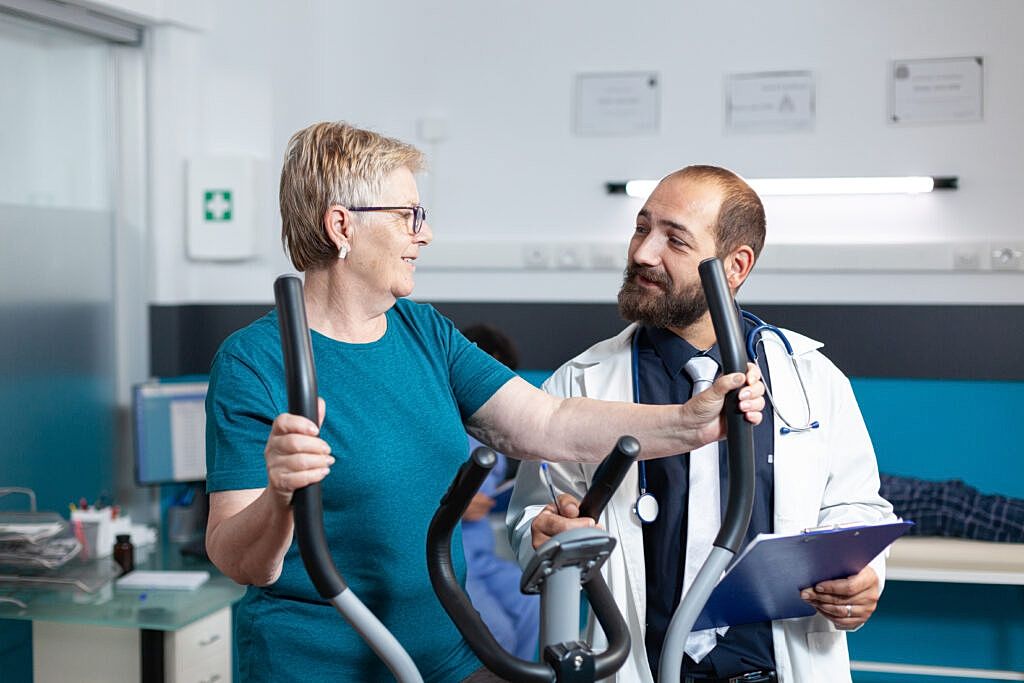
People are often unsure about what a physiologist (also known as an exercise physiologist) does and how we can help improve their health and fitness. Whether you're recovering from a spinal condition, aiming to enhance your overall fitness, or simply trying to prevent injuries, a physiologist can play a significant part in helping you achieve your goal. We design personalized exercise and rehabilitation programs tailored to your unique needs, particularly when it comes to spine health. Maintaining a healthy spine is crucial not just for mobility but also for supporting overall well-being.
An exercise physiologist is a specialized healthcare professional who helps individuals improve their health and well-being through customized exercise programs. Their expertise extends beyond standard fitness guidance, offering tailored solutions designed to address each person's unique physical health needs and challenges. While we work with individuals from all walks of life, our expertise is particularly valuable for those dealing with spinal issues or recovering from surgeries. A physiologist designs custom programs to help patients strengthen their bodies, regain mobility, and prevent further complications.
For instance, for individuals with chronic back pain caused by spinal stenosis or a herniated disc, a thorough assessment is conducted. Based on the findings, an exercise regimen is developed to alleviate discomfort and improve spinal stability. Our work bridges the gap between physical therapy and personal fitness training, ensuring you safely and effectively achieve your goals.
Working with a physiologist offers numerous advantages that go beyond traditional fitness training. Here are some key benefits.
Improved Physical Fitness: We develop exercise plans to build strength, flexibility, and endurance, which are all crucial for maintaining a healthy spine and overall body.
Injury Prevention: A physiologist educates you on proper posture, movement, and form to avoid injuries that could affect your spine or other areas.
Rehabilitation Support: Whether you're recovering from spinal surgery or managing a chronic condition, a physiologist provides guidance to safely restore your strength and mobility.
Long-Term Health Benefits: Beyond addressing immediate concerns, we help you adopt sustainable lifestyle changes to maintain health and fitness for years to come.
Our goal is to empower you with the tools and knowledge needed to take charge of your health while minimizing risks associated with spine-related challenges.
 Focusing on Spine Health
Focusing on Spine HealthAt The Institute for Comprehensive Spine Care, our physiologist pays special attention to spine health because of its central role in your overall well-being. A healthy spine supports your body's structure, facilitates movement, and protects your nervous system. However, conditions such as degenerative disc disease, sciatica, or poor posture can compromise its function. Here's how we address these issues.
Strengthening Core Muscles: Your core muscles play a vital role in supporting your spine. Weak core muscles can lead to instability and back pain, but targeted exercises can strengthen them and reduce pressure on your spine.
Improving Posture: Poor posture can strain your spine over time, leading to discomfort and even injury. A physiologist teaches techniques to align your spine properly and maintain good posture in daily activities.
Rehabilitation for Spinal Conditions: If you're dealing with sciatica, herniated discs, or post-surgery recovery, we create a customized program to safely manage your condition and improve your quality of life.
Our focus on spine health doesn't just alleviate pain-it enhances overall mobility and helps prevent future problems.
A strong connection exists between your overall health and the health of your spine. A physiologist encourages patients to view their fitness journey as a holistic approach that benefits their entire body. Here are some ways overall health and fitness contribute to a healthier spine.
Weight Management: Excess weight places additional stress on your spine, increasing the risk of conditions such as herniated discs or sciatica. By incorporating weight management strategies into your fitness plan, you can reduce this strain and improve spinal health.
Flexibility and Mobility: Stretching and mobility exercises keep the spine supple, reducing stiffness and discomfort. These exercises are integral to maintaining the flexibility needed for a full range of motion.
Cardiovascular Fitness: Cardio exercises improve blood flow to the spine, promoting healing and reducing inflammation. This is especially important for individuals recovering from spinal injuries or surgery.
Stress Reduction: Stress often manifests as tension in the back and neck. Regular exercise, guided by a physiologist, helps release endorphins, reducing stress and its impact on your spine.
Muscle Rehabilitation: Strengthening and rehabilitating muscles around the spine provides better support and reduces the risk of future injuries. Whether you have weak or imbalanced muscles due to injury or a sedentary lifestyle, I can guide you through a program that restores function and stability.
A well-rounded approach to health and fitness directly contributes to the strength, flexibility, and endurance needed to support your spine effectively.
Many people can benefit from working with a physiologist, especially when it comes to improving spine health. Here are some examples.
Individuals with Spinal Conditions: If you're dealing with chronic back pain, herniated discs, or spinal stenosis, a physiologist can design exercises to alleviate pain and improve function.
Post-Surgical Patients: Recovering from spinal surgery requires careful guidance to restore strength and mobility without risking complications.
Those Seeking Injury Prevention: A physiologist teaches you how to move properly and safely, reducing the risk of spinal injuries during daily activities or workouts.
Achieving Overall Fitness: Even if you don't have spinal issues, a physiologist can help you optimize your health and fitness while protecting your spine.
Whether you're addressing a specific condition or striving for general health improvements, working with a physiologist can help you reach your goals safely and effectively.
 Your Partner in Spine Health
Your Partner in Spine HealthAt the Institute for Comprehensive Spine Care, our in-house physiologist is dedicated to helping you achieve optimal spine health and overall fitness. We specialize in creating personalized exercise and rehabilitation programs tailored to your unique needs, with a particular focus on supporting your spine.
Whether you're recovering from spinal surgery, managing a chronic condition, or simply aiming to improve your fitness, our physiologist will guide you every step of the way. By strengthening core muscles, improving posture, and addressing muscle imbalances, we help you build a strong foundation for a healthy spine and body.
Don't let back pain or spinal issues keep you from living your best life. Take the first step toward better health and fitness by scheduling a consultation today.
A physiologist, also known as an exercise physiologist, specializes in creating personalized exercise programs that improve health, enhance fitness, and support recovery from medical conditions. They focus on building strength, improving mobility, and addressing specific health needs, particularly for individuals with spine-related issues.
A physiologist designs tailored exercise programs to manage and improve conditions such as herniated discs, spinal stenosis, and sciatica. They focus on strengthening core muscles, improving posture, and rehabilitating muscles to reduce pain and enhance spinal stability.
Anyone looking to improve their health and fitness can benefit from a physiologist's expertise. This includes individuals with chronic back pain, those recovering from spinal surgery, people seeking to prevent injuries, and anyone wanting to optimize their overall fitness while protecting their spine.
Good overall fitness supports spine health by reducing excess weight, improving flexibility and mobility, increasing blood flow to the spine, and reducing stress. A physiologist helps incorporate these elements into your routine, directly benefiting your spine and overall well-being.
Yes, physiologists are instrumental in post-surgery recovery. They guide patients through safe, progressive exercises that restore strength, mobility, and function while minimizing the risk of complications or reinjury.
If you're experiencing chronic pain, recovering from an injury or surgery, or looking for a safe way to enhance your fitness, a physiologist can provide the support and expertise you need. They can help address specific issues, like back pain or poor posture while promoting long-term health improvements.
December 26, 2024
Dr. Gbolahan Okubadejo, MD, FAAOS is one of New Jersey's top spine surgeons and the head of The Institute for Comprehensive Spine Care. Dr. Okubadejo has been in practice for over 15 years. He received his undergraduate degree from Brown University in Providence, Rhode Island, and went on to receive a medical degree from the prestigious Johns Hopkins University School of Medicine in Baltimore, Maryland. He completed his internship and orthopedic surgery residency at Barnes-Jewish Hospital at the Washington University School of Medicine in St. Louis, and completed a spine surgery fellowship at the University of Pittsburgh Medical Center in Pittsburgh. Dr. Okubadejo completed his fellowship in 2008.